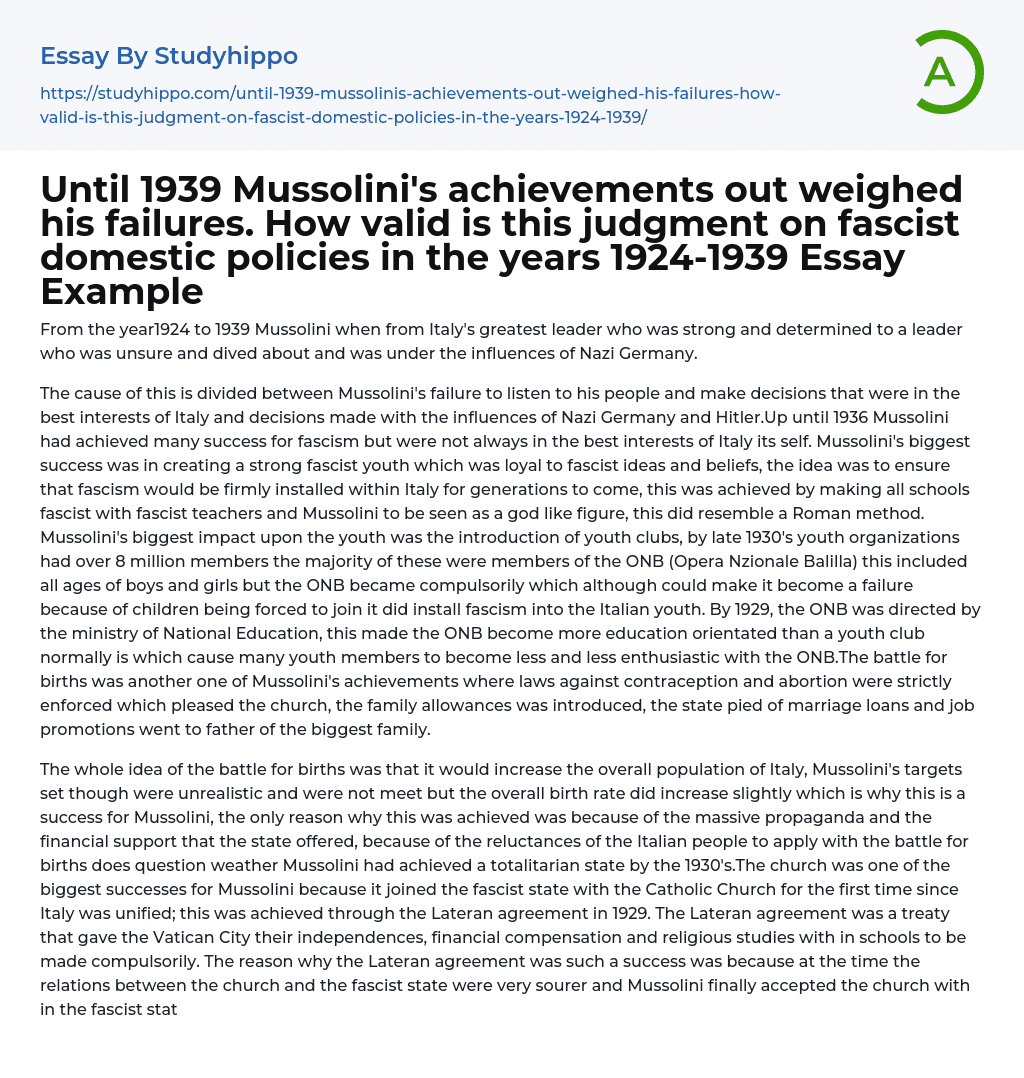From 1924 to 1939, Mussolini's leadership in Italy underwent a transformation from being a resolute and forceful individual to becoming indecisive and unpredictable, with significant influence from Nazi Germany.
Mussolini's disregard for the wishes of the Italian people and his decisions influenced by Nazi Germany resulted in the current situation. Although fascism had been successful under Mussolini's leadership until 1936, it was not always beneficial for Italy as a whole. One of Mussolini's notable accomplishments was instilling strong loyalty to fascist ideals and values among the younger generation. This was achieved through ensuring that schools and teachers adhered to fascist principles, presenting Mussolini as a godlike figure reminiscent of ancient Rome, and establishing youth clubs with over 8 million members enlisted in various organizations by the late 1930s. While organizations like ONB included all genders and ages, their compulsory
...nature could cause problems. Nevertheless, these efforts succeeded in establishing fascism as a potent force within Italy's youth.
In 1929, the Ministry of National Education directed ONB towards education rather than typical youth activities leading to a decline in enthusiasm among young people. Additionally, Mussolini implemented his "battle for births" policy which banned contraception and abortion pleasing the Church while introducing family allowances, state-paid marriage loans, and job promotions for fathers with larger families were also part of his achievements.
The objective of the battle for births was to increase Italy's population. Although Mussolini's targets were unrealistic and not met, the overall birth rate did slightly increase. This success can be attributed to massive propaganda and financial support from the state. However, the reluctance of the Italian people to comply with the battle for births raises questions about whethe
Mussolini had achieved a totalitarian state in the 1930s.
One of Mussolini's biggest successes was the alignment of the fascist state with the Catholic Church, which hadn't occurred since Italy's unification. This alignment was achieved through the Lateran Agreement of 1929, which granted Vatican City independence, financial compensation, and compulsory religious studies in schools. The agreement improved relations between the church and the fascist state, which had been negative. However, the church later regretted this agreement due to Mussolini's foreign policies and his relationship with Hitler.
The Lateran agreement was significant for Mussolini as it gave him the freedom to expand his empire without worrying about domestic issues. To involve the Italian people more in fascism, Mussolini established OND (Opera Nazionale Dopolavoro) in 1925 with the aim of offering them free leisure and entertainment. This government agency was controlled by the fascist party, and by 1939, it had 4 million members, although it wasn't as successful as ONB, which was compulsory. OND's activities mainly consisted of free or subsidized holidays and days out. While this made the fascist party appear popular, many individuals joined for the free entertainment instead of supporting fascism. Until 1936, there were more successes than failures; however, Mussolini's domestic policies began to backfire and cause problems for both him and the fascist party from 1936 to 1939.
Mussolini's oversight of the south worsened over time and proved to be a massive mistake. He aimed for self-sufficiency or Anarchy, but this vision was hindered by the south's poverty and lack of agricultural and production capabilities. The fascist battle for grain plan was inefficiently executed, further exacerbating the problem in the south while
diverting resources from other critical issues. Despite his attempts, Mussolini failed to eliminate the Mafia's presence leading to significant monetary losses over time. His tendency to dictate how people should greet each other illustrates his growing over-protectiveness towards citizens and treating them like children as he tried changing Italian culture.
Mussolini renamed the youth organization to "the Italian youth of the Lictors" (GIL) with the purpose of enhancing military and physical training for young people, in order to create fascist soldiers who revered him as their deity. Nevertheless, his imitation of Hitler's anti-Semitic policies in 1939 resulted in a backlash from Catholics and the Church, which was unfavorable since most Italians were Catholic. Before 1936, when Mussolini's government policies were not widely criticized, he enjoyed acceptance among Italians; however, his meddling with domestic matters after that year caused growing skepticism among students, churchgoers and young people alike, ultimately leading to his loss of popularity within the party.
- Culture essays
- Social Control essays
- Citizenship essays
- Social Justice essays
- Caste System essays
- Social Responsibility essays
- Socialization essays
- Deviance essays
- Modern Society essays
- Popularity essays
- Civil Society essays
- Community essays
- Female essays
- Filipino People essays
- Igbo People essays
- Indigenous Australians essays
- Indigenous Peoples essays
- Minority Group essays
- Social Institution essays
- Men essays
- The nation essays
- Middle Class essays
- Social Norms essays
- Discourse Community essays
- Popular Culture essays
- Car Culture essays
- American Culture essays
- Mormon essays
- Indian Culture essays
- Mexican Culture essays
- Pop Culture essays
- Cultural Differences essays
- Culture Shock essays
- Different Cultures essays
- D-day essays
- Fascism essays
- Activism essays
- Communism essays
- Conservatism essays
- Liberalism essays
- Marxism essays
- Nationalism essays
- Patriotism essays
- Policy essays
- Public Policy essays
- Social Contract essays
- Socialism essays
- Totalitarianism essays
- American Civil War essays
- Atomic Bomb essays




